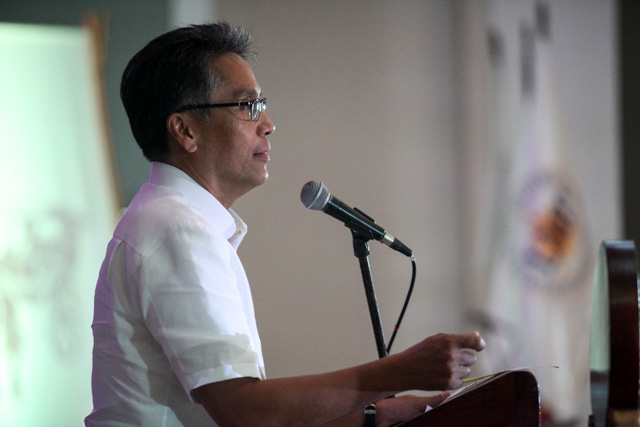
MANILA, Philippines – On the anniversary of a proclamation that ushered in dark days for democracy in the Philippines, administration standard-bearer Manuel Roxas II highlighted one role the next president will have that “not many realize.”
President Benigno Aquino III’s successor will be appointing 11 justices of the 15-strong Supreme Court (SC), since a majority of its members now are nearing retirement age. In contrast, Aquino only got to appoint 5 SC justices, including Chief Justice Maria Lourdes Sereno.
“Of the incumbent court, we can say that only two will represent a continuity with succeeding courts. Unfamiliarity – or worse, hostility to the painstaking gains and reforms of the past five years and decades –will have a direct, potentially colossal impact not only on the justice system, but on the nation as a whole,” Roxas said on Wednesday, September 23, at a gathering of the Philippine Bar Association in Makati.
Roxas, former interior secretary of the Aquino Cabinet, is running a campaign rooted on the promise of continuity and certainty – that he is the candidate who will best continue “Daang Matuwid (Straight Path),” the Aquino administration’s anti-corruption, good governance, and transparency platform.
Speaking before a small hall full of lawyers, Roxas took a quick jab at former president turned Pampanga Representative Gloria Macapagal-Arroyo, who appointed over 21 justices in her 9 years as president.
“Will the next president rely on old, transactionalist paradigms in choosing his or her appointees? Will he or she treat this as an exercise in weaving a personal, legal safety net? Or will probity, integrity, and competence be the most important criteria in deciding who will be performing the crucial task of being a Justice of the Supreme Court?” said Roxas.
Arroyo has been accused of picking justices based on who would best protect her interests after she stepped down from office. Among the most controversial of Arroyo’s appointees was former chief justice Renato Corona, who was ousted in the first few years of the Aquino administration over inconsistencies in his Statement of Assets, Liabilities, and Net Worth (SALN).
The SC has made several key decisions under the Aquino administration: it declared unconstitutional the Priority Development Assistance Fund (PDAF) as well as two executive acts under the Aquino administration’s Disbursement Acceleration Program (DAP); put on hold several government projects; and upheld the constitutionality of major provisions of the Reproductive Health (RH) Law, among others.
EDCA, SALN issues
The SC is still set to decide on the Enhanced Defense Cooperation Agreement (EDCA), a deal signed between the Philippines and the US that would allow the latter's troops to “preposition logistics within [Philippine] shores.”
Some in government are questioning EDCA, alleging that it must first be ratified by the Senate.
“Given the assertiveness of our neighbor to the northwest, this issue must be decided by men and women who will interpret the law not just from a theoretical perspective but from the highest and broadest national interest,” said Roxas, referring to China, which is claiming practically the entire disputed West Philippine Sea (South China Sea).
Roxas also talked about concerns that the next batch of justices would make decisions that would weaken the “powerful tool” that is the SALN.
He said: “Its power is diluted by a cumbersome, sometimes overly secretive process and bureaucracy. Will we get a set of justices committed enough to transparency and amenable to publishing SALNs automatically?"
Roxas added: "And what about bank secrecy? Any proposal to waive bank secrecy for public officials will certainly encounter resistance from some quarters, and inevitably reach the Supreme Court, whose members themselves may be affected by such a decision.”
‘Justice delayed, progress denied’
Legal issues, said Roxas, can also be a threat to development.
“By some estimates, several trillion pesos of economic assets are in limbo, and therefore unproductive, because it is mired in the long processes of our courts: Long-litigated disputes in the corporate world, or as regards land, inheritance, and other such battles, tie up time and money from across the broad spectrum of society,” he said.
They also have implications on peace and stability in war-torn parts of Mindanao. Unresolved land disputes, he said, have “bred conflict…across the generations” between Christians, Muslims, and Lumad in Mindanao.
“Not only is 'justice delayed, justice denied' – justice delayed is also development denied,” he added.
It was then that Roxas again pitched the promise of continuity and certainty, a message he has been repeating in sorties all over the Philippines.
“The question that confronts us now is one that has often been repeated by PNoy: Do we build on the achievements of the present, or do we try to reinvent the wheel? Do we go from strength to strength, or do we once again kick the can down the road, perpetually mired in a cycle of botched momentum and unexecuted plans?” he said.
On Wednesday, the Social Weather Stations (SWS) released the results of its presidential preference survey, that showed Roxas trailing Senator Grace Poe and Vice President Jejomar Binay. Given the survey’s margin of error, however, their numbers put them in a statistical tie if elections were held when the survey was conducted, or from September 2-5.
Speaking to reporters after the event, Roxas thanked Filipinos for their support but also downplayed the September survey because, he said, the most important survey ultimately comes on election day in May 2016.
“Magmula ngayon at sa araw na iyon ay ipre-presenta natin ang ating plataporma, ang ating programa, ang ating pagkatao sa ating mga kababayan para nga makaipon tayo ng suporta para sa sinusulong nating Daang Matuwid,” he said.
(From now until election day, we’ll present our platform, our programs of government, and our very core to our people to gather support from our countrymen in continuing ‘Daang Matuwid.’) – Rappler.com